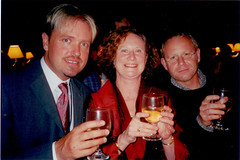Interview with Denise Grocke, WFMT President, 1999-2002
By Barbara L. Wheeler
Dr Denise Grocke was appointed President of the WFMT at the World Congress in Washington DC (1999). She served from November 1999 to July 2002. Below is a transcript of an interview with her as she recalls her time as President. The interviewer is Barbara Wheeler.
What was happening in the world of music therapy when you were President?
The main influence during my Presidency was the development of the World Wide Web. Prior to 1999, the WFMT Council had already started to discuss how the web might change the way WFMT functioned. But in 1999, it had really changed many things. The published Newsletter for example became obsolete, as all the news items about conferences, training etc., were available on individual web pages of relevant institutions. In fact in my time as President, no WFMT Newsletters were published.
One of the first decisions of the WFMT Council (1999-2002) was to establish a web site for the WFMT. We had already begun discussion with Professor David Aldridge at University of Witten-Herdecke, as he had started the musictherapyworld site. The Council decided that was the best-established international forum at that time. The WFMT site carried a history (written by Dr Tony Wigram), the Constitution & Bylaws, official definition of music therapy, ethical guidelines and education guidelines in English and Spanish languages. David Aldridge also insured that music therapy literature was available on the site, including “grey” material (postgraduate theses etc). He also posted a regular Newsletter to collate the news of the time on the one site.
What were the highlights of your Presidency?
I had been the Chair of the Education and Training Commission from 1993-1999, and I instigated a 2-day symposium of the Education Commission, to address the issue of whether the WFMT should create its own Guidelines for Education Training Programs. A group of 16 invited academics from different countries gave presentations about the content and extent of their training, including didactic components and clinical training. We came to the point where we needed to decide if we would establish Guidelines for the world, and I recall Professor Ken Bruscia wisely saying “let’s keep them brief, and not try to work out hours and competencies.” The WFMT Guidelines were then crafted, and were just one page in length. I also recall the excitement when the 16 delegates to the Education Symposium found that the term “bio-psycho-social’ was understood and used throughout the world.

Another highlight of my Presidency was the 2002 Congress in Oxford, England. I recall the awe-inspiring opening in the Bodlian library, and seeing the galleries of music therapists from all over the world collected in this historic place. Other memories are of the service in the chapel at Keble College, the walks along the streets of Oxford, and the wonderful keynote speech by The Very Reverend Michael Mayne.
What is the lasting legacy of your Presidency?
I think the WFMT changed dramatically between 1999-2002. It had accomplished its main objectives, namely the Constitution and By-Laws, an international definition of music therapy, ethical guidelines, and Education & Training guidelines. It had succeeded in providing representation across all continents of the world on its commissions, and it had embraced the web technology as a means to distribute information widely and immediately. The continuing role for the WFMT was to host the World Congress and to insure that successive generations of music therapists were brought onto the working commissions.
Denise has shared a number of pictures from the 2002 Congress in Oxford, England:

